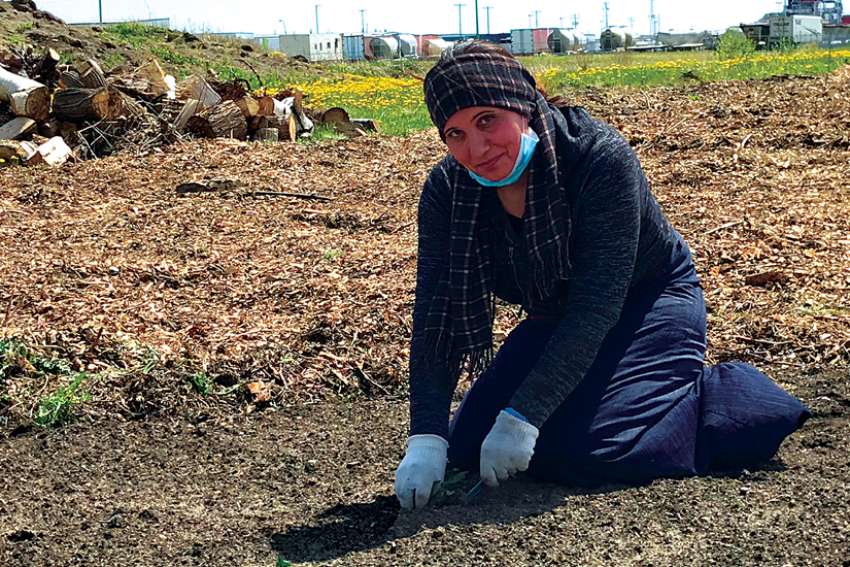Preparing the soil, planting seeds, adding water and fertilizing transfers her mind and and soul back to Sinjar, Iraq, to the days when she cultivated vegetables alongside her husband and seven children.
Two or three times a week during spring and summer, she gardens at the Land of Dreams, a long-gestating initiative launched 11 months ago by the Calgary Catholic Immigration Society (CCIS).
“Since we have begun to plant on this land in Canada, I feel physically, mentally and emotionally better than before,” says Zandinen through translator Kheirya Khidir, a settlement counsellor for the CCIS.
Profound devastation was inflicted upon Zandinen, her family and the Yazidi people of Sinjar starting on Aug. 3, 2014 when ISIL forces invaded the northern Iraq town in the Nineveh governorate — an area with a long history of being the homeland to Iraq’s minority populations.
A study published by PLOS Medicine estimated that over the course of a month between 2,000 and 5,500 Yazidis were killed and over 6,000 Yazidis — primarily women and children — were kidnapped. About a half million Yazidis were displaced, many fleeing to the nearby Mount Sinjar.
Zandinen and her family were abducted. After about two years in captivity, she was released. Zandinen and three of her children were among 288 Yazidis that the CCIS welcomed to Calgary in 2017. Last year one of her sons was released and immigrated to Canada.
She does not know the status of her husband and two older children. She found out a month ago that her 10-year-old daughter Sonia has been freed, but global travel restrictions due to COVID-19 have prevented mother and daughter from being reunited.
The CCIS offers a wide range of resettlement and integration services to newcomers, including securing accommodations, counselling, employment workshops and work experiences, and helping refugee children integrate into schools. The Roman Catholic Diocese of Calgary is a key partner through its sponsorship program.
Dozens of Canadian newcomers were at the Land of Dreams in the Rocky View County of southeast Calgary on May 28 to plant strawberries, spinach and garlic, and to enjoy fellowship with each other. CCIS CEO Fariborz Birjandian says about 100 people have been farming since the beginning of May.
Birjandian says the decision to coin the area, which currently has 21 circular plots, as the Land of Dreams was a nod to how these newcomer families regard life in Canada.
“Most of the people involved here are refugees. They really have gone through hell. They come here with a lot of hope. We want them to see that they are a part of this country, part of this community by having them do something they are familiar with. Everything else they do they are not familiar with.”
Maryam Illyas, another Yazidi woman from Sinjar, who came to Canada in 2017 with her husband, two children and sister, says the Land of Dreams gives families a sense of what life was like in Sinjar before the destruction.
“Before we couldn’t work in the land after we ran from ISIS,” said Illyas through Khidir. “Now, we feel we are in the same village.”
Rod Olsen, a regenerative urban farmer, is overseeing the Land of Dreams. He says he hopes newcomer families — hailing from 16 different countries including Afghanistan, India, Somalia and Syria — could become ecological leaders through this initiative.
“Newcomers who have been displaced can feel like they do not have power or any agency. When they heal the soil, they gain a sense that they’re able to impact Mother Earth in a positive way, I think that it equals us all.
“I think we all as a human species are carrying this sense of ecological grief, and most of us don’t know what to do. We are being given a beautiful opportunity to get right at a core at what we can do and what we need to do. They can become leaders to teach the rest of us Canadians that this is what the land needs right now.”
In addition to refugee families, CCIS is looking to honour local First Nations communities.
Birjandian envisions teepees and sweat lodges being built on the land. The arrangement of the circular soil plots is an homage to the First Nations as it will eventually resemble an Indigenous medicine wheel when four quadrants of eight plots are formed.
Olsen says the work to forge a bond with the First Nations communities is ongoing.
“Elders are super busy with work in their communities. We have this great desire to have them be a part of this, but it is taking time. We want to find an elder who has the time and passion to be involved. It is a big ask. We’re saying, ‘come and educate newcomers and educate urban farmers.’ We assume that it is a good idea for them to do. I think, slowly, the (relationship) is growing.”
There is palpable excitement among the farmers about the new beehives being installed in the coming weeks and the harvest reward to come over the next several months.
The CCIS website states that the 2019 growing season — which operated only from July to September due to heavy spring precipitation — “yielded over 500 pounds of beets, carrots, kale, spinach, collard greens, cabbage, potatoes and more.” The newcomers take home the food that they plant, and if one of them requests to plant a particular seed, the CCIS tries to honour that wish.
Zandinen remarks that she has enjoyed “planting in Canada with different seeds” than back home. She can look around at her children and friends gardening a plot on The Land of Dreams and to some extent feel she has stepped back in time.


